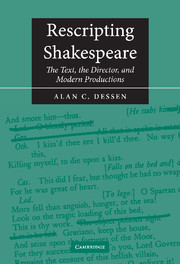Book contents
- Frontmatter
- Contents
- Acknowledgments
- Note on documentation
- List of abbreviations
- 1 “Let it be hid”: price tags, trade-offs, and economies
- 2 Rescripting Shakespeare's contemporaries
- 3 Adjustments and improvements
- 4 Inserting an intermission/interval
- 5 What's in an ending? Rescripting final scenes
- 6 Rescripting stage directions and actions
- 7 Compressing Henry VI
- 8 The tamings of the shrews: rescripting the First Folio
- 9 The editor as rescripter
- Conclusion: what's not here
- Appendix: productions cited
- Notes
- Index
2 - Rescripting Shakespeare's contemporaries
Published online by Cambridge University Press: 22 September 2009
- Frontmatter
- Contents
- Acknowledgments
- Note on documentation
- List of abbreviations
- 1 “Let it be hid”: price tags, trade-offs, and economies
- 2 Rescripting Shakespeare's contemporaries
- 3 Adjustments and improvements
- 4 Inserting an intermission/interval
- 5 What's in an ending? Rescripting final scenes
- 6 Rescripting stage directions and actions
- 7 Compressing Henry VI
- 8 The tamings of the shrews: rescripting the First Folio
- 9 The editor as rescripter
- Conclusion: what's not here
- Appendix: productions cited
- Notes
- Index
Summary
“Comparisons are odorous”
Dogberry, 3.5.16Given the lip service (Macbeth terms it “mouth honor”) paid to Shakespeare's artistry, some theatrical professionals are hesitant about rescripting, at least in its most visible forms. Such restraints can disappear, however, when the script in question is linked to Kyd, Marlowe, Jonson, Dekker, Marston, Webster, Middleton, Ford, or Beaumont and Fletcher. When confronting such less prestigious playwrights, directors can more readily imagine themselves as an Elia Kazan reshaping and giving fuller meaning to raw material provided by a Tennessee Williams. To investigate the rescripting process in this group of plays (labeled “primitive” by one director I talked with) is then to see the same kinds of omissions and alterations found in productions of Shakespeare but on less contested ground.
To deal with such material is to run various risks. First, readers in tune with the major plays of Shakespeare are less likely to be familiar with Every Man In His Humour, The Fawn, The Maid's Tragedy, or The Broken Heart so may find some of the accounts that follow mystifying. Moreover, the rationale behind the adjustments to these non-Shakespeare plays is often comparable to that outlined in chapters 1 and 3, so that there is a danger of redundancy. Nonetheless, to focus on the rescripting of such plays is to see with added clarity issues and problems basic to this study, a consummation devoutly to be wished.
- Type
- Chapter
- Information
- Rescripting ShakespeareThe Text, the Director, and Modern Productions, pp. 38 - 63Publisher: Cambridge University PressPrint publication year: 2002



